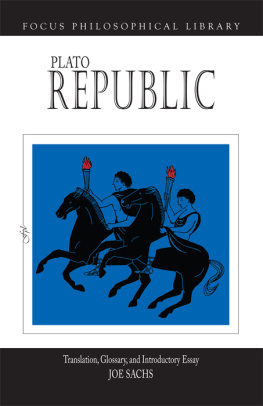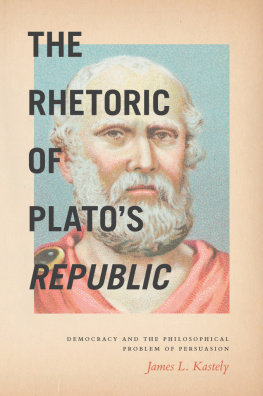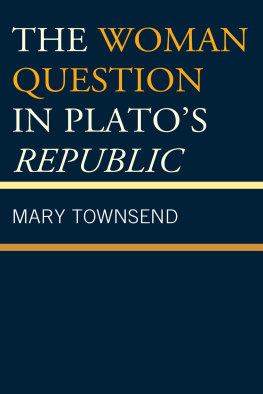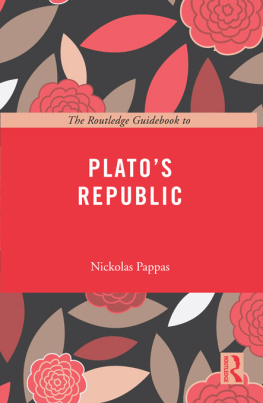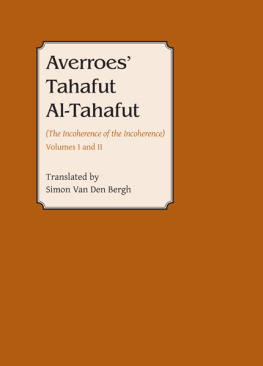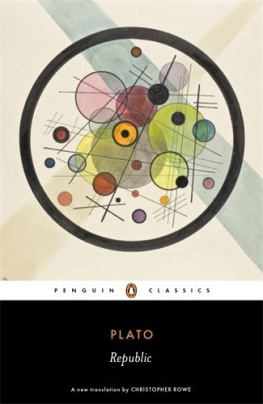Averroes on Platos Republic [trans. Ralph Lerner] (Cornell - Averroes on Plato’s Republic
Here you can read online Averroes on Platos Republic [trans. Ralph Lerner] (Cornell - Averroes on Plato’s Republic full text of the book (entire story) in english for free. Download pdf and epub, get meaning, cover and reviews about this ebook. year: 2014, publisher: CornellUP, genre: Science. Description of the work, (preface) as well as reviews are available. Best literature library LitArk.com created for fans of good reading and offers a wide selection of genres:
Romance novel
Science fiction
Adventure
Detective
Science
History
Home and family
Prose
Art
Politics
Computer
Non-fiction
Religion
Business
Children
Humor
Choose a favorite category and find really read worthwhile books. Enjoy immersion in the world of imagination, feel the emotions of the characters or learn something new for yourself, make an fascinating discovery.
- Book:Averroes on Plato’s Republic
- Author:
- Publisher:CornellUP
- Genre:
- Year:2014
- Rating:4 / 5
- Favourites:Add to favourites
- Your mark:
- 80
- 1
- 2
- 3
- 4
- 5
Averroes on Plato’s Republic: summary, description and annotation
We offer to read an annotation, description, summary or preface (depends on what the author of the book "Averroes on Plato’s Republic" wrote himself). If you haven't found the necessary information about the book — write in the comments, we will try to find it.
Averroes on Platos Republic [trans. Ralph Lerner] (Cornell: author's other books
Who wrote Averroes on Plato’s Republic? Find out the surname, the name of the author of the book and a list of all author's works by series.
Averroes on Plato’s Republic — read online for free the complete book (whole text) full work
Below is the text of the book, divided by pages. System saving the place of the last page read, allows you to conveniently read the book "Averroes on Plato’s Republic" online for free, without having to search again every time where you left off. Put a bookmark, and you can go to the page where you finished reading at any time.
Font size:
Interval:
Bookmark:

Averroes on Platos Republic
TRANSLATED, WITH AN INTRODUCTION
AND NOTES, BY Ralph Lerner
Cornell University Press
ITHACA AND LONDON
You have here something close to what Abl-Wald Muammad Ibn Amad Ibn Rushd (known to the Latins as Averroes) wrote toward the end of the twelfth century in Crdoba. Little more can be asserted with confidence and candor because it may be three centuries since anyone last saw a copy of the Arabic text. What has come down to us is a Hebrew translation of the Arabic, composed by Samuel ben Judah in the early fourteenth century in Provence and preserved in eight manuscripts in varying states of completeness. Based on that Hebrew translation, there have been one Hebrew summary (by Joseph Caspi in 1331) and four translationstwo in Latin (by Elia del Medigo in 1539) and two in English, of which this is the latest. Very much, then, turns on the capability and accuracy of the two translators who stand between you and the author. Samuel has already made his apologies (see Appendix I); it only remains for me to speak on my own behalf.
This new English translation is presented in the belief that it marks an improvement in accuracy and intelligibility over the pioneering critical edition and translation of E. I. J. Rosenthal. addresses itself, among other things, to this assertion and offers an alternative interpretation.
It is a special pleasure to acknowledge publicly the help I have received from others. Every translator builds on the work of his predecessors. It is only common courtesy to acknowledge that their efforts (especially those of Rosenthal) have helped me through a tangled and by no means unambiguous textsometimes by providing examples to follow, at other times by leading me to further reflection on Samuels text and Averroes intention.
I am indebted to Muhsin Mahdi for his incisive criticisms of the translation and for giving his counsel unstintingly, promptly, and with delicacy. I am also grateful to Shlomo Pines for helpful suggestions concerning some of the more obscure and intractable passages in this text.
In ways varied and many (as Averroes might say), I have drawn upon the insights and energies of my guide to the world of the falsifa, Leo Strauss. This volume is dedicated to his memory.
R. L.
Chicago, Illinois
Expositio Comentatoris Averois in librum Politicorum Platonis, MS Siena, Biblioteca Comunale degli Intronati, G VII 32, fols. 158r188r. (I have used enlargements from microfilm.)
Averrois Cordubensis Paraphrasis in libros de Republica Platonis, in Aristotelis Opera cum Averrois Commentariis (Venetiia apud Junctas, 1562; reprint ed., Frankfurt am Main: Minerva G.m.b.H., 1962), III, 334v372v.
Averroes Commentary on Platos Republic, University of Cambridge Oriental Publications, no. 1 (Cambridge: Cambridge University Press, 1956; reprinted with corrections, 1966, 1969); hereafter cited as Rosenthal.
MS Munich, Bayrische Staatsbibliothek, Hebr. 308, fols. IV-43V.
MS Florence, Biblioteca Medicea Laurenziana, Conventi Soppressi 12, fols. 94r129v. (I have used enlargements from microfilm.)
See the review of Rosenthal by J. L. Teicher, Journal of Semitic Studies, 5 (1960):176195, especially pp. 193 f.
See the review of Rosenthal by Shlomo Pines, IyyunHebrew Philosophical Quarterly, 8 (1957): 65-84.
Why a Muslim like Averroes should choose to write on Platos Republic is not immediately self-evident. Of what use is this pagan closet philosophy to men who already hold what they believe to be the inestimable gift of a divinely revealed Law, a shara? Can that Law, which presents itself as complete and sufficient and which addresses all men, the Red and the Black, be in need of supplement or correction? Further, what has the lawyer, imm, judge, and unique scholar (as Averroes chooses to describe himself elsewhere) to do with those matters that Plato makes the theme of the Republic? We know that this list of titles exhausts neither Averroes interests nor his qualifications. Aquinas and Dante have in mind no one else when they speak of the Commentator on Aristotles works. Marrkush, in his History of the Maghrib, repeats a first-person account in which Averroes explains to a pupil how he was led to summarize Aristotles works in response to the wish of the ruler Ab Yaqb and the urgings of the latters chief physician and vizier, Ibn ufayl. This epitome or paraphrase of the Republic is to be seen, then, as a part of that larger project, for as Averroes himself says at the beginning of this work, he has taken up Platos book because Aristotles Politics has not yet fallen into our hands (22.5). But all this, while it accounts for some things, leaves unanswered the earlier and more basic question: What is the standing of pagan philosophy in the Muslim community ? We may say, with little exaggeration, that almost the first and last words of this work point to the utility, relevance, even necessity, of political science (21.7; 105.5-6). Again and again, Averroes quietly points out that this practical science, far from being superseded by the shara, is no less needed in these cities. Just how badly needed is, in a way, one of the larger lessons of the work. Their very lack of awareness of their sickness is itself a measure of how sick these cities truly are.
Even if we accept the notion that Plato has something to teach the adherents of religious Law about the ways of preserving or restoring political health, it can hardly be said that the Plato who appears in these pages is altogether familiar. Only a detailed, point-by-point comparison of this work with the text of the Republic can disclose the many differences between the two. Least to be wondered at is the Islamization of the Republic; Greek divinities and examples are replaced by examples better known to Averroes readers. More remarkable are the substantive discrepancieselaborations where Plato is brief, omissions, changes in details, interpolations drawn from Aristotle or Farabi or others. How much weight ought to be given to these variations from our text of the Republic must remain a matter of controversy, complicated by the fact that not a single Arabic translation of a complete Platonic work is known to have come down to us. I n the absence o f the text that Averroes had before him when he sat down to compose this work, we can only hazard some guesses about the significance of the discrepancies. We cannot even be sure that they are departures from Plato. Judging from the Arabic translations of Greek texts that are extant, the translators did their work with intelligence and skill. Careful readers of this or of the Hebrew translation will have no difficulty in recognizing many passages that disclose great fidelity even to the nuances of Platos text. In brief, we cannot know for a certainty whether whatever of Averroes account strikes us as baffling or simply wrong in the light of our present-day understanding of Platos text does so because of inadvertence or design. Averroes thoughts may not be our thoughts.
In this age in which we are urged on all sides to flaunt whatever we believe we have, this restrained work of Averroes is triply strange. The falsifa (as the medieval philosophers are called in Arabic) do not as a rule strut forth proclaiming their ingenuity, originality, and superiority over their predecessors. Quite the contrary: a good deal of their ingenuity and originality is devoted to concealing their singularities. The present text by Averroes is a fine case in point, for in truth it is no simple matter to tell in every instance whether Averroes is speaking in his own name. The gentle glidings from he says to we say and back again (with variations en route) lull the senses of the good-natured reader who nods along as Averroes repeats whatever Plato says or asserts or holds or explains. Every once in a while, however, that good-natured reader is jolted by various devices into wondering where Averroes himself stands on these matters. Sometimes Averroes tells him directly ; sometimes he tells him indirectly. Sometimes Averroes merely plants the question. In all cases, however, Averroes moves with boldness and determination in setting before the attentive reader the problems that matter, the problems posed by the confrontation of classical political philosophy and the
Font size:
Interval:
Bookmark:
Similar books «Averroes on Plato’s Republic»
Look at similar books to Averroes on Plato’s Republic. We have selected literature similar in name and meaning in the hope of providing readers with more options to find new, interesting, not yet read works.
Discussion, reviews of the book Averroes on Plato’s Republic and just readers' own opinions. Leave your comments, write what you think about the work, its meaning or the main characters. Specify what exactly you liked and what you didn't like, and why you think so.

![Averroes on Platos Republic [trans. Ralph Lerner] (Cornell Averroes on Plato’s Republic](/uploads/posts/book/324094/thumbs/averroes-on-plato-s-republic-trans-ralph.jpg)
